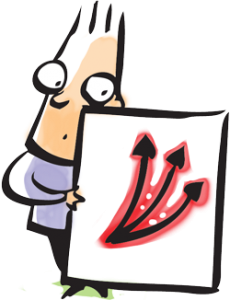David Ogilvy started up O & M, one of the largest advertising agencies in the world. That very same David suggested that headlines were the most important factor in communication.
Not by a factor of 2:1
Or 3:1
But a whopping 4:1.
He suggested that 80% of your article is dependent on your headline. His exact words were: “On average, five times as many people read the headline as read the body copy. When you have written your headline, you have spent eighty cents out of your dollar.”
Of course there might be no proof to sustain this crazy statement, but there is common sense
And common sense tells us that we will not respond to something if it's not attractive enough to us. So if you were to attend a seminar in your town, you'd look for the headline. If you were to buy a book, that “headline” is the book title and the sub-title (often the sub-title is more important). And the same applies to articles.
No matter where people are looking for your article, they're first looking at the headline
Why do they do that? Because of several reasons:
1) Is this for me?
2) Is it something I know or don't know?
3) Would I get any benefit by reading this?
So let's take an example, just from my head, of course
Headline 1: Why eating honey and cinnamon may not do your arthritis any good.
So what are the factors in that headline?
1) Is this for me? Do you have arthritis? If so, boof, you're trapped.
2) Is this something I know or don't know? Well, I didn't know about honey and cinnamon. And if I did, then why is it not good? I'd want to know.
3) Would I benefit from reading this? Yes, if I had arthritis, this would definitely help me use/rule out what I'm about to do next. I might stop my supply of honey, change it, or order more.
So as you can see, the factors at play force you to read the article. These factors create a solid wrapping of curiosity that's impossible to ignore—if you have or will have arthritis. Though you may also read it if you don't have it and someone in your family or friends circle has the problem.
So the headline isn't just a nice little title
It's a time bomb that you spotted three seconds ago, and is about to go off. You have to pay attention right now, and you are then forced to slide right into the article, just to see what the article is all about. Of course it's at this point that the baton is passed over from the headline to the rest of the article. And now it depends on the writer's skill at holding the reader's attention within the main body of the article.
But without the headline, the curiosity would never have stirred
You'd never read the main copy.
So David Ogilvy was right.
80% of the advertising depends on your headline.
Give or take a few percent, I'm sure.
Top Selling Products Under $50
1) Testimonial Secrets: Powerful Techniques to Get Better Clients-And Sales
2) Story Telling Series: How to suck your audience right in, in a matter of seconds
3) Sales Pages: How To Write Benefits and Bullets That Speed Up Sales
4) Article Writing: How To Speed Up Article Writing With Simple Outlines
5) Visual Basics: How Visuals Help Increase Sales Conversion On Your Website
6) Design Clarity: How to put sanity into your design with some really simple tweaks
7) Chaos Planning: How ‘Irregular' Folks Get Things Done
1) Black Belt Presentation Series: How to completely control the room—without turning anyone off?
2) New! Online Membership Sites: How To Build A Powerful, Community-Driven Membership Website


Sorry to sound pedantic but as this piece is about headlines I feel I need to point out that the “off” in your headline is redundant and meaningless. It should read, and would have greater impact, if it said:
Headline Writing: Three Core Factors That Trigger Curiosity